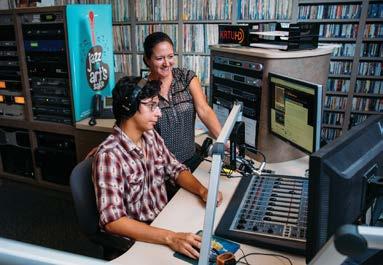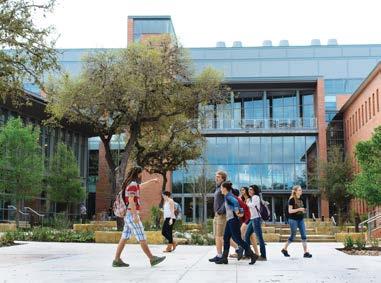
FINANCIAL AID 2024-202 5
Trinity University provides students with a remarkable educational experience in a stimulating and collaborative environment. An education of Trinity’s quality requires a significant investment. The staff of Student Financial Services, a department encompassing both the Financial Aid Office and Student Accounts Office, is committed to working in partnership with students and families to identify financial options and strategies that will help make a degree from Trinity an attainable goal.
This guide contains important information about your financial aid offer. In it you will find answers to many of the questions you may have related to the financial aspect of your enrollment at Trinity. We encourage you to keep it for future reference.
The staff in the Financial Aid Office is ready and willing to help you whether you are embarking on your Trinity experience, are in the middle of your journey, or nearing the completion of your degree.

STUDENT FINANCIAL SERVICES
FINANCIAL AID OFFICE
One Trinity Place
San Antonio, TX 78212-7200
Phone: 210-999-8898
Fax: 210-999-8316
Email: studentfinancialservices@trinity.edu
Online: gotu.us/sfs
TABLE OF CONTENTS
FINANCIAL AID BASICS
Applying for Aid
Determining Eligibility
Verification
Revisions
Appeals
Availability of Funding
External Resources
Study Abroad
Financial Aid Renewal
Satisfactory Academic Progress
Withdrawal Policy
Taxability of Scholarships and Grants
STUDENT ACCOUNT INFORMATION Estimating Cost Disbursing Financial Aid Paying the Balance Due Receiving a Refund of Your Credit Balance SCHOLARSHIPS AND GRANTS Trinity Academic Scholarship Baker Duncan Scholarship Trinity Music Scholarship International Scholarship Transfer Scholarship National Merit Trinity Scholarship Semmes Distinguished Scholarship in Science Storer and Tillman Scholarship for Developing Christian Leaders Trinity Tower Scholarship Tuition Exchange Scholarship Endowed Departmental Scholarship Trinity Grant Trinity Tiger Grant Federal Pell Grant Federal SEOG Texas TEG LOAN PROGRAMS Federal Direct Subsidized/Unsubsidized Loan Walton Perkins Loan Walton Family Loan Private Alternative Loan Federal Direct PLUS Loan for Parents Walton Parent Loan Loan Comparison Chart STUDENT EMPLOYMENT CONSUMER INFORMATION UNIVERSITY CONTACT INFORMATION 1 1 2 2 3 3 3 4 4 4 5 5 7 7 7 8 9 9 9 9 9 10 10 10 10 10 11 11 11 11 11 11 13 15 15 15 16 16 16 17 18 19

FINANCIAL AID BASICS
APPLYING FOR AID
Trinity University requires students to complete two financial aid applications to be considered for the full array of available resources: the Free Application for Federal Student Aid (FAFSA) and the College Board’s Profile. Information provided on the FAFSA is used to determine eligibility for federal and state aid. Profile information is used to determine eligibility for institutional need-based aid. Both the FAFSA and Profile are required for each year that you wish to apply for financial aid at Trinity. While only U.S. citizens and permanent residents may submit the FAFSA to apply for federal financial aid, all students, including international students, may complete the Profile.
The FAFSA and Profile are not required for the renewal of merit scholarships.
DETERMINING ELIGIBILITY
We consider a number of factors in determining a student’s eligibility for financial aid. Financial aid can be categorized as need-based, non-need based, or merit-based. Need-based aid is available to students whose families do not have sufficient financial resources to pay for college as determined by an analysis of their aid application. Merit-based aid, such as academic scholarships, is awarded without regard to financial circumstances. Completion of the aid application also provides students and parents access to non-need based aid in the form of low interest loans. The formula for determining financial need is:
Cost of Attendance - Student Aid Index = Financial Need
Cost of Attendance
The cost of attendance (COA) is an estimated budget of the direct and indirect expenses you can expect to incur during the academic year. Direct expenses are standard charges billed by Trinity that appear on your student account. These include tuition and various fees, as well as meal plan and housing expenses if you are living on campus. Indirect expenses are costs you should plan for that are not billed by Trinity. These costs include books and supplies, transportation and personal expenses, and living expenses if you reside off campus. The COA used to determine your eligibility for financial aid is listed at the bottom of your financial aid offer. It is important to note that the COA is an estimate; your actual costs may vary.
Student Aid Index The student aid index (SAI) is calculated from the information you and your family provide on your aid application. You can think of the SAI as an index used to determine how much and which types of financial aid you are eligible to receive from federal and state sources. The formula by which your SAI is calculated considers such factors as income, assets, and family size, among others. Again, the SAI is primarily a tool to assess aid eligibility and is not necessarily the amount you will be required to pay for one year of college. Your actual out-of-pocket expenses may be higher or lower than your SAI depending on the aid you receive.
FINANCIAL AID 2024-2025 1 TRINITY UNIVERSITY
Financial Need In working toward meeting your financial need, we consider all financial aid for which you are eligible, including merit-based aid. Students who do not demonstrate financial need or who receive scholarships in excess of their financial need are not eligible for funding from need-based programs. While Trinity strives to create financial aid packages that fully meet financial need, limited funding or eligibility criteria prevent us from achieving this goal for every student.
VERIFICATION
Verification refers to the process used to validate information you report on your federal aid application (FAFSA). Your application may be selected for verification by either the federal processor or the Trinity financial aid staff. It is essential that you respond promptly to any requests for documents necessary to verify the information provided on your aid application.
Timely completion of verification is critical to securing the financial aid funds offered to you. If your aid application is selected for verification, no further processing, up to and including disbursing aid to your student account, will take place until verification is complete.
Note: Verification must be completed no later than October 1. All need-based aid will be canceled in full if verification is outstanding after this date.
REVISIONS
Your financial aid offer may be revised if the information used to determine your eligibility changes.
A revised financial aid offer supersedes any previous notification. Carefully review any revisions to determine if you must take any additional action to secure funding. The following are examples of situations that should be promptly reported to the Financial Aid Office and may result in a revision:
Change in Enrollment Status You must be enrolled full time (at least 12 credit hours) each semester to receive University funds. Federal and state funding may be available to students who are enrolled at least half time. If you are enrolled less than full time at the end of the add/ drop period, your eligibility for aid will be reviewed and funding will be adjusted as necessary.
Verification Trinity is required to correct inaccurate information on the FAFSA discovered through the verification process. We will use the revised information to determine your eligibility for federal and state financial aid. Significant corrections to your FAFSA data through the verification process may cause a change in eligibility and result in a revised financial aid offer.
Receipt of External Resources Aid received from sources other than Trinity University, such as scholarships, loans, or educational benefits received through community groups, companies or private agencies, can impact your eligibility for other aid programs and prompt a revised financial aid offer.
Change in Information Used to Determine Eligibility If you update the information provided on the aid application, enroll in fewer than two semesters in an academic year or live off campus, it may be necessary to revise your financial aid. Should your family experience a significant financial setback, such as an involuntary loss of employment, please contact the Financial Aid Office.
TRINITY UNIVERSITY 2 FINANCIAL AID 2024-2025
APPEALS
Due to the extraordinary demand for financial assistance, appeals are considered only when extenuating circumstances can be thoroughly documented. Eligibility for financial aid is reviewed annually, allowing families to provide updated information regarding changes to financial circumstances during the standard aid application process.
Note: The Financial Aid Office does not change or negotiate awards based on comparisons with financial aid offers received from other colleges.
AVAILABILITY OF FUNDING
Trinity reserves the right to adjust financial aid offers if federal or state funding for aid programs fall short of anticipated levels. Increases in federal or state funding may also affect financial aid offers, including Trinity University grants and scholarships.
EXTERNAL RESOURCES
External resources are funds awarded by an organization other than Trinity University. These include scholarships awarded by high schools, religious, civic or other organizations, state and federallyfunded scholarships or loans not listed in this guide, or education benefits received from an employer of the student or parent. The receipt of such funding will have no impact on financial aid previously offered to many students, but occasionally, the receipt of external resources may require the University to reduce the amount of federal and/or state need-based aid offered to a student so that the total aid does not exceed the student’s financial need.
If an adjustment is necessary, University policy is to adjust need-based federal and/or state aid in the following order: Federal Direct Subsidized Loan, Federal Work-Study, Federal SEOG, Texas TEG, and Federal Pell Grant. University scholarships and grants will be reduced only if the total of external resources and University aid exceed the total cost of attendance used to determine eligibility for aid.
Students must inform the Financial Aid Office of any external funds they will receive in a given year, regardless of the amount, and inform donors to send payments directly to the Financial Aid Office. It is University policy to divide scholarship funds equally between the fall and spring semesters, although scholarship donors may request a different distribution of funding by providing written instructions with the scholarship payment.
FINANCIAL AID 2024-2025 3 TRINITY UNIVERSITY
STUDY ABROAD
Students participating in an approved semester or year-long study abroad program are eligible to receive financial assistance through federal, state, and institutional programs. Approved programs are those led by Trinity University faculty and programs offered by other institutions on Trinity’s Study Abroad Provider List. Students who elect to participate in a non-approved program may not use financial aid facilitated by Trinity University’s financial aid office to meet costs.
FINANCIAL AID RENEWAL
Financial aid is offered on an annual basis. You must reapply for assistance each spring for the upcoming academic year. Complete the FAFSA and Profile no later than March 1 for priority consideration of funding. Students whose family financial situation remains fairly constant from year to year can expect to remain eligible for similar need-based resources each year.
Students are required to remain in good academic standing with the University as well as meet satisfactory academic progress requirements as defined in this guide. In addition, students receiving merit-based scholarships must continue to meet cumulative GPA and other renewal requirements specific to the scholarship. Institutional aid requires full time enrollment by the end of the add/drop period (at least 12 credit hours) and is extended for a maximum of eight semesters or until undergraduate degree requirements are met, whichever is earlier.
SATISFACTORY ACADEMIC PROGRESS
Federal and state regulations, as well as Trinity University policy, require that students make adequate progress toward their intended degree in order to maintain eligibility for financial aid. Satisfactory academic progress (SAP) is monitored annually by the Financial Aid Office at the end of the academic year. Adequate progress is defined as:
• Minimum 2.0 cumulative GPA
• Successful completion of at least 75 percent of the credit hours you attempt
- Attempted hours include the courses you are enrolled in at the end of the add/drop period each semester.
Students who fail to demonstrate progress are considered ineligible for future financial assistance; an appeal process exists for students who have extenuating circumstances that prevent satisfactory progress.
While institutional aid may be received for no more than eight semesters of undergraduate study, students may receive federal student aid for a maximum of twelve semesters of undergraduate study.
Note: Recipients of state funding must meet requirements as determined by the aid program.
TRINITY UNIVERSITY 4 FINANCIAL AID 2024-2025
WITHDRAWAL POLICY
Registered students who completely withdraw from all classes after the start of a semester may be eligible for a refund of charges through the Student Accounts Office in accordance with University policy. The Financial Aid Office will determine how much financial aid a student is eligible to retain in light of the withdrawal. Eligibility for federal student aid is determined using a federally mandated calculation known as “Return to Title IV” or “R2T4.” This calculation determines the amount of federal student aid a student is eligible to retain using a pro-rata formula based on the number of days in the semester. The determination of eligibility for institutional and state aid is based on Trinity’s refund of charges schedule. For example, a student who is charged 50 percent of tuition as a result of the date of withdrawal is eligible to retain 50 percent of disbursed institutional aid. Students considering withdrawal from the University are strongly encouraged to meet with a counselor in the Financial Aid Office to discuss the financial implications of such a decision. Students who earn all F’s in a given semester will be considered to have unofficially withdrawn and may be subject to a return of federal student aid.
TAXABILITY OF SCHOLARSHIPS AND GRANTS
All scholarships and grants, regardless of source, received in a calendar year that exceed the cost of tuition, books, and supplies for that calendar year are subject to federal income tax, even if they are used for housing and food costs. The University is not responsible for notifying students of the taxable amounts of grants and scholarships. The Financial Aid Office cannot serve as a tax consultant or financial adviser. Detailed information concerning the taxability of scholarships and grants can be found in IRS Publication 970 Tax Benefits for education on www.irs.gov or by consulting a tax advisor.

FINANCIAL AID 2024-2025 5 TRINITY UNIVERSITY

STUDENT ACCOUNT INFORMATION
The Student Accounts Office produces itemized statements of account activity and collects payments. Fall semester statements are issued in July with payment due in August. Spring semester statements are issued in December with payment due in January. In addition to the semester statement, monthly statements are issued directly to students when an outstanding balance exists. Trinity also offers the option of a monthly payment plan that allows the account balance to be paid in four interest-free installments over the course of each semester, not including summer.
ESTIMATING COST
To determine your financial responsibility, first decide which financial aid programs listed on your financial aid offer you intend to use, then simply subtract the aid amount from the estimated direct costs that will be billed to your student account. Trinity’s Cost Worksheet is a tool that is intended to assist you in calculating your anticipated student account balance--the amount you must pay or the amount that will be refunded. You should know how you will pay any anticipated student account balance by the payment due date each semester.
DISBURSING FINANCIAL AID
At the beginning of each semester financial aid will be applied directly to your student account to address charges such as tuition and fees. Such disbursements require all paperwork to be complete and all funds to be processed and received by the University. This means that you should complete paperwork for any loans you intend to borrow at least one month prior to the start of the semester.
Note: All aid for the fall semester should be disbursed to your student account no later than September 1. All aid for the spring semester should be disbursed to your student account by February 1. Any aid not disbursed by these dates is subject to cancellation.
PAYING THE BALANCE DUE
Several options are available to address any balance due on your student account. Trinity offers an interest-free semester payment plan which allows the semester balance to be paid in four monthly installments. A modest fee of $30 is required each semester to enroll in the payment plan. Families may enroll in the payment plan via the Student Account Suite once semester statements have been issued. Additionally, some families elect to address the balance due through longterm financing options like the Federal Direct PLUS Loan for Parents or a Private Alternative Loan (see page 15-16 for more information). Whichever payment option or combination of options you choose, your student account balance must be settled by the payment due date each semester.
FINANCIAL AID 2024-2025 7 TRINITY UNIVERSITY
RECEIVING A REFUND OF YOUR CREDIT BALANCE
Aid applied to a student account that exceeds the balance owed will create a credit balance that may be refunded to the student. Students and families are strongly encouraged to enroll in e-refund (direct deposit) via the Student Account Suite to receive a credit balance refund. Refunds must be used to cover education-related expenses such as off-campus housing, transportation, or books and supplies. If you are anticipating a credit balance refund for living expenses or other educationrelated expenses, be advised that refund processing begins after the add/drop period ends each semester and plan your finances accordingly. Students needing to use a credit balance to purchase books may request that funds be transferred to Tiger Bucks for use in the University Bookstore.

TRINITY UNIVERSITY 8 FINANCIAL AID 2024-2025
SCHOLARSHIPS AND GRANTS
Trinity Academic Scholarship
Murchison, Trustees’, President’s, Dean’s, Trinity, and Trinity Tiger Award
Trinity recognizes academic performance by offering these merit-based scholarships at the time of admission to first-year students who have distinguished scholastic records. Students are considered for these awards based on a variety of factors, including academic preparation and performance, class rank and test scores if provided, and application essay. Scholarships are renewable for up to eight semesters of undergraduate study, not including summers, provided the student maintains satisfactory academic progress (SAP).
Baker Duncan Scholarship Art, Debate, and Theatre
Merit-based Baker Duncan Scholarships recognize talent in designated areas and are awarded to first-year students through an application process established by the respective department or program. The scholarship is renewable for up to eight semesters of undergraduate study provided recipients maintain satisfactory academic progress (SAP) and meet participation requirements for debate or academic major/minor requirements for the Departments of Art and Theatre.
Trinity Music Scholarship
Awarded to first-year students by faculty in the Department of Music, the Trinity Music Scholarship is merit-based and is renewable provided recipients maintain satisfactory academic progress (SAP) and participate in one or more music ensembles. Renewal is upon recommendation by faculty in the Department of Music.
International Scholarship
The International Scholarship is awarded at admission to selected first-year students who are neither U.S. citizens nor U.S. permanent residents. It is renewable for up to eight semesters of undergraduate study provided the recipient makes satisfactory academic progress (SAP).
Transfer Scholarship
A merit-based scholarship, the Transfer Scholarship is awarded at admission to entering transfer students in recognition of exceptional scholastic achievement. The scholarship is renewable if the student maintains satisfactory academic progress (SAP).
FINANCIAL AID 2024-2025 9 TRINITY UNIVERSITY
National Merit Trinity Scholarship
This merit-based scholarship is awarded to first-year students who have been selected as National Merit Finalists and designate Trinity University as their first choice college with the National Merit Scholarship Corporation by May 1. The National Merit Trinity Scholarship is renewable provided the student enrolls full-time each semester and makes satisfactory academic progress (SAP).
Semmes Distinguished Scholarship in Science *
A full-tuition scholarship that includes a one-time $5,000 stipend to be used for research support, professional travel, materials and supplies, the Semmes Distinguished Scholarship in Science is merit-based. It is renewable provided the student maintains satisfactory academic progress (SAP), at least a 3.0 cumulative GPA, and majors in the sciences, engineering, or mathematics. Students receiving the Semmes Distinguished Scholarship are not eligible to receive other institutional grants or scholarships.
Storer and Tillman Scholarship for Developing Christian Leaders
This scholarship is awarded to entering students who demonstrate financial need and a commitment to developing their leadership skills in the context of their faith. Scholarships are renewable for up to eight semesters of undergraduate study provided the student maintains satisfactory academic progress (SAP), continues to demonstrate sufficient financial need, and participates in their selected service study, worship, and fellowship opportunities on and around campus.
Trinity Tower Scholarship *
A limited number of full-tuition scholarships are awarded to entering students invited to participate in a scholarship competition. Invitations are issued to highly-qualified students in the top portion of the applicant pool, with recipients selected by faculty members. Students must maintain satisfactory academic progress (SAP) and at least a 3.0 cumulative GPA for renewal. Students receiving the Trinity Tower Scholarship are not eligible to receive other institutional grants or scholarships.
Tuition Exchange Scholarship * ACS, Rice, and TEI
The Tuition Exchange Scholarship is a full-tuition scholarship available to students who are dependents of eligible employees at participating institutions. A limited number of awards are offered to entering students each year. Scholarships are renewable for up to eight semesters of undergraduate study, not including summers, provided the student maintains satisfactory academic progress (SAP) and continues to be deemed eligible by the participating institution to retain the scholarship. Students receiving the Tuition Exchange Scholarship are not eligible to receive other institutional grants or scholarships.
* Note: Full-tuition scholarships address 12-18 credit hours per semester.
TRINITY UNIVERSITY 10 FINANCIAL AID 2024-2025
Endowed Departmental Scholarship
Numerous endowments have been established to recognize outstanding achievement within specific academic departments. Each spring faculty within the respective departments select recipients for the following academic year.
Trinity Grant
A need-based grant from institutional resources, the Trinity Grant is available to students who demonstrate financial need as determined by the FAFSA and Profile. Renewal is contingent upon continued demonstrated financial need and satisfactory academic progress (SAP).
Trinity Tiger Grant
A need-based grant from institutional resources, the Trinity Tiger Grant is available to students who demonstrate financial need as determined by the FAFSA and Profile. Renewal is contingent upon continued demonstrated financial need and satisfactory academic progress (SAP).
Federal Pell Grant
The Federal Pell Grant is awarded to students demonstrating exceptional financial need who meet the program’s specific requirements. Award amounts are determined through a mandated federal formula that considers the SAI and enrollment status of the student. Funding for the Federal Pell Grant program is appropriated annually by Congress. Students must file the FAFSA each year to be considered for a Federal Pell Grant, and recipients must demonstrate satisfactory academic progress (SAP) toward achieving a degree.
Federal SEOG
A need-based federal grant, the Federal Supplemental Educational Opportunity Grant (SEOG) is awarded to students with exceptional financial need with priority given to those who are also receiving a Federal Pell Grant. Students who have a valid FAFSA on file with the federal processor by March 1 each year are given priority consideration for this limited funding. Recipients must demonstrate satisfactory academic progress (SAP) toward achieving a degree.
Texas TEG
The Texas Tuition Equalization Grant (TEG) is a need-based grant available to Texas residents attending a private college or university within the state. Funding is limited and priority is given to students who demonstrate significant financial need and submit the FAFSA by March 1. Recipients must maintain a cumulative GPA of 2.5, earn at least 24 credit hours each academic year, complete at least 75 percent of the credit hours attempted during the academic year, and continue to demonstrate significant financial need to remain eligible.
FINANCIAL AID 2024-2025 11 TRINITY UNIVERSITY

LOAN PROGRAMS
Approximately half of Trinity graduates take advantage of educational loans in combination with other aid resources and financing strategies to make a Trinity education possible. These loans are designed to provide students the option of borrowing against their future earning potential which research indicates improves with educational attainment. Students and families are encouraged to borrow responsibly. It is important to fully understand the terms of any loan that you choose to borrow as spelled out in the promissory note you will be required to sign prior to receiving loan funding. Loans must be repaid after graduation or withdrawal from school and some loans require interest payment while the student is in school. We encourage students to limit the amount of debt they accumulate while in college to the extent they are able to do so, but we also recognize student loans to be a viable financing option. Again, it is important to manage your loan debt by being an informed and thoughtful borrower
Federal Direct Subsidized/Unsubsidized Loan
The Federal Direct Loan program is administered by the U.S. Department of Education with loan borrowing facilitated by the University. Federal direct loans are available to students regardless of financial need, and information can be found online at studentloans.gov.
Federal Direct Subsidized Loans are offered to meet demonstrated financial need. Students who do not demonstrate financial need or have their demonstrated financial need met through other sources are awarded Federal Direct Unsubsidized Loans. Students may be awarded subsidized, unsubsidized, or a combination of both types of loans. The financial aid offer indicates the maximum amount of Federal Direct Loan a student may borrow for the academic year.
The Bipartisan Student Loan Certainty Act of 2013 ties federal direct student loan interest rates to financial markets. Under this act, interest rates will be determined each spring for loans being made for the upcoming academic year, which runs from July 1 to June 30 of the following year. Each loan will have a fixed interest rate for the life of the loan. The interest rate for Federal Direct Subsidized and Unsubsidized Loans for undergraduate students disbursed between July 1, 2023 and June 30, 2024 is a fixed rate of 5.50 percent.
Loans borrowed for an academic year are offered in equal installments—half at the beginning of the fall semester, and half at the beginning of the spring semester. An origination fee of approximately 1 percent of the gross loan amount is withheld at disbursement.
Below are the maximum annual amounts that may be borrowed by dependent students:
• First-year students may borrow up to $5,500, of which a maximum of $3,500 may be subsidized.
• Sophomores may borrow up to $6,500, of which a maximum of $4,500 may be subsidized.
• Juniors and seniors may borrow up to $7,500, of which a maximum of $5,500 may be subsidized.
Note: Students borrowing under the Federal Direct Loan Program for the first time are required to complete a Master Promissory Note and entrance counseling online with the U.S. Department of Education at studentloans.gov in order to receive funding. The financial aid offer indicates Direct Loan borrowing eligibility. All students must actively notify the Financial Aid Office of their intent to borrow.
FINANCIAL AID 2024-2025 13 TRINITY UNIVERSITY

TRINITY UNIVERSITY 14 FINANCIAL AID 2024-2025
Walton Perkins Loan
The Walton Perkins Loan is a need-based loan program funded by the University and awarded to students demonstrating significant financial need whose parents’ adjusted gross income is greater than $50,000 a year. Both the student borrower and a cosigner must complete the requisite promissory note online annually with ECSI, a third-party loan servicer, used by the University to handle billing and other services related to administration of the Walton Loan Program. The interest rate is fixed at 5 percent and begins to accrue at the time of repayment, six months after the student is no longer enrolled at least half time at Trinity. Students have up to 10 years to repay the Walton Perkins Loan and may defer (postpone) payments while enrolled in graduate or professional school.
Walton Family Loan
Funded by the University, the Walton Family Loan is offered to help meet educational costs for a limited number of students whose parents’ adjusted gross income is greater than $50,000 a year. Both the student and a cosigner must complete an online promissory note each year to secure the loan funding offered. The interest rate for the Walton Family Loan is fixed at 5 percent, and payments on the principal are deferred while the student is enrolled at least half time at Trinity. Interest payments, however, must be made monthly. Repayment of the loan principal begins six months after the student leaves Trinity or falls below half-time enrollment. Payments are made over a 10-year period. Students may borrow up to $4,000 per year, not to exceed the COA minus other financial aid, and up to a maximum of eight semesters of undergraduate study. An annual credit approval may be required for continued receipt of the Walton Family Loan. Interested families should inquire with their assigned financial aid counselor.
Private Alternative Loan
Many private lenders offer loan programs that can be used to cover education expenses not already covered by federal student loans or other sources of financial aid. Because these loans are typically more expensive than federal student loans, they should be used only when all other sources of funding have been exhausted. Private alternative loans are typically credit-based and require that undergraduate students have a credit worthy cosigner to qualify. Interest rates, grace periods, repayment options and fees may vary considerably. While the Financial Aid Office is able to discuss the various private loan options, we are prohibited from recommending a lender or loan program. Credible and Elm Select are available tools for students to research and compare various private loan options. Students may borrow from any lender of their choosing. Borrowers are encouraged to carefully evaluate the terms of each loan program to determine which loan will best suit their needs.
FINANCIAL AID 2024-2025 15 TRINITY UNIVERSITY
*
Federal Direct PLUS Loan for Parents
The Federal Direct PLUS Loan Program allows credit-worthy parents or stepparents of undergraduate students to borrow the difference between the COA and the financial assistance received by the student. The interest rate for Federal Direct PLUS Loans disbursed between July 1, 2023 and June 30, 2024 is a fixed rate of 8.05 percent. Origination fees up to 5 percent of the principal amount borrowed are withheld at the time of disbursement. Students must submit the FAFSA to the federal processor in order for parents to be considered for this loan program. More information, as well as the application for the Federal Direct PLUS Loan, can be found online at studentloans.gov.
Walton Parent Loan
A limited number of Walton Parent Loans of up to $10,000 per year are available for parents of dependent students who do not qualify for need-based financial assistance after review of the Profile. The interest rate is fixed at 5 percent, and payments on the principal are deferred while the student is enrolled at least half time at Trinity. Interest payments, however, must be made monthly. Repayment of the principal begins within a month of the student’s graduation or withdrawal from Trinity. Payments are made over a 10-year period. The amount of the loan plus other aid extended to the student may not exceed the COA*. An annual credit approval may be required for continued receipt of the Walton Parent Loan. Interested families should inquire with their assigned financial aid counselor.
*See page 1
Loan Comparison Chart
Interest payments made monthly.
Contact your financial aid counselor to apply.
TRINITY UNIVERSITY 16 FINANCIAL AID 2024-2025 Link to Loan Details Lender Borrower Maximum Amount Origination Fee Current Interest Rate Additional Information Subsidized Direct Student Loan Federal Student See Financial Aid Offer 1.057% 5.50% No interest while enrolled. Unsubsidized Direct Student Loan Federal Student See Financial Aid Offer 1.057% 5.50% Interest accrues upon disbursement. Walton Perkins Loan** Trinity University Student $2,000 per semester 0.00% 5.00% No interest while enrolled. Contact your financial aid counselor to apply. PLUS Loan for Parents Federal Parent COA minus Other Aid 4.228% 8.05% Parent can defer payment while student is enrolled in college. Private Loans Banks/ Other Private Entities Student & Parent COA minus Other Aid Determined by Lender Determined by Co-Signer Credit Requires a credit worthy co-signer. Walton Family Loan** Trinity University Student & Parent $2,000 per semester 0.00% 5.00% Interest payments made monthly.
your
counselor
Walton Parent Loan** Trinity University Parent $5,000 per semester 0.00% 5.00%
Contact
financial aid
to apply.
Walton loan (Perkins, Famly, or Parent) per period
enrollment.
*Students/families who meet the eligibility criteria can only borrow one
of
STUDENT EMPLOYMENT
Many Trinity students find working part time while enrolled to be a beneficial and rewarding aspect of their college experience. Students typically use their earnings to cover personal expenses. The student employment process at Trinity is facilitated through the Office of Human Resources located in Northrup Hall. Work-study positions are available whether or not the student qualifies for Federal Work-Study (FWS). Open positions for all types of student employment will be accessible in Handshake around the start of the fall semester each academic year.
Students typically work about 8 to 10 hours per week. Students may work no more than 20 hours per week while classes are in session, and no more than 40 hours per week when classes are not in session. The pay rate for on-campus jobs is floored at $7.25 per hour. Earnings are paid bi-weekly directly to the student based on the number of hours worked in the corresponding pay period. Work-study earnings are taxable as wages and must be reported to the IRS if a student is required to file a tax return.
As with any job, students must complete federally required employment forms with the Office of Human Resources to document that they are eligible to work in the U.S. Completion of the I-9 employment eligibility form is required before beginning employment at the University, and the W-4 Withholding Form is recommended to ensure proper tax withholding.
Note: In order to complete the I-9 form, students are required to show Human Resources staff certain original documents such as a U.S. passport OR a driver’s license AND original Social Security Card. Faxed or copied documents cannot be accepted.

FINANCIAL AID 2024-2025 17 TRINITY UNIVERSITY
CONSUMER INFORMATION
As a student, you have the right to:
• Know the correct procedures and deadlines for applying for aid as well as the types of aid available.
• Understand how the cost of attendance and financial need is determined.
• Be informed about the type and amount of aid you are eligible to receive, any steps you must take to secure that aid and how it will be disbursed.
• Know the criteria for awarding aid, how satisfactory academic progress is determined, and what you have to do to remain eligible to receive aid.
• Request a financial aid review if you experience changes that impact your ability to address educational costs.
• Know what portion of the financial aid offered is in the form of a loan and must be repaid. Loan borrowers have the right to know the interest rate, total amount that must be repaid, repayment procedures as well as the length of the repayment period and when it begins.
As a student, you have the responsibility to:
• Know and comply with all policies and procedures of Trinity University.
• Read and consider all material provided to you by Student Financial Services and other awarding agencies. Understand all forms that you are asked to submit or sign and keep copies for your records.
• Understand the financial obligation associated with enrollment at Trinity and be prepared to address it prior to beginning classes each semester.
• Complete all financial aid applications and forms accurately and submit them by the appropriate deadlines. Respond quickly to requests for additional documentation related to verification and ensure that submitted materials are complete and accurate.
• Inform the Financial Aid Office if you intend to live off campus, receive any external scholarships or intend to enroll less than full-time (at least 12 credit hours) in any given semester as these may require an adjustment to aid offered.
• Regularly monitor your Trinity email account as this is the primary communication channel used by the Financial Aid Office. Failure to monitor your Trinity email does not relieve you of the responsibility to act or respond in a timely manner.

TRINITY UNIVERSITY 18 FINANCIAL AID 2024-2025
UNIVERSITY CONTACT INFORMATION
Office of Admissions
1-800-TRINITY or 210-999-7211
admissions@trinity.edu
gotu.us/admissions
Center for International Engagement—Study Abroad
210-999-7313
studyabroad@trinity.edu
gotu.us/studyabroad
Office of Human Resources—Student Employment
210-999-7507
humanresources@trinity.edu
gotu.us/humanresources
Office of Residential Life
210-999-7219
reslife@trinity.edu
gotu.us/reslife
Office of the Registrar
210-999-7201
roffice@trinity.edu
gotu.us/registrar
Student Financial Services—Student Accounts Office
210-999-8898
studentfinancialservices@trinity.edu
gotu.us/sfs

FINANCIAL AID 2024-2025 19 TRINITY UNIVERSITY

STUDENT FINANCIAL SERVICES
FINANCIAL AID OFFICE
Trinity University
One Trinity Place
San Antonio, TX 78212-7200
gotu.us/sfs












